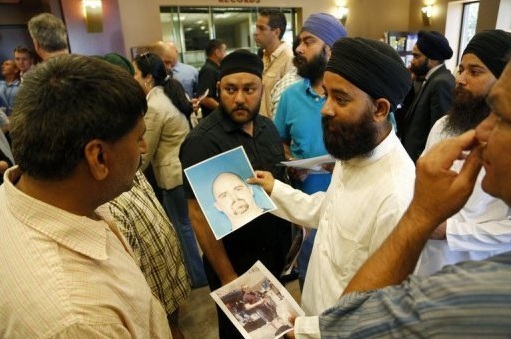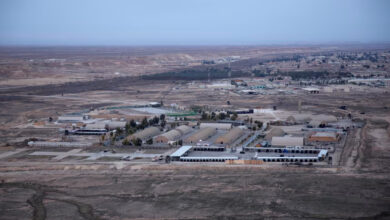
OAK CREEK, Wisconsin — The gunman who killed six people at a Wisconsin Sikh temple was a 40-year-old US Army veteran and authorities said they were investigating possible links to white supremacist groups, including his membership in a skinhead rock band.
The assailant, shot dead by police at the scene on Sunday, was identified as Wade Michael Page. He served as an Army soldier from 1992 to 1998, said police chief John Edwards in the Milwaukee suburb of Oak Creek where the 400-member temple is located.
Page killed six people and seriously wounded three, including a police officer, at the Sikh Temple of Wisconsin as worshippers prepared for religious services. There was a fourth person wounded less seriously who was already released from the hospital.
The dead were five men and one woman, aged between 39 and 84. Members of the Sikh community said the president of the congregation and a priest were among the victims.
Authorities said they were treating the attack as a possible act of domestic terrorism. American Sikhs said they have often been singled out for harassment, and occasionally violent assault, since the September 11, 2001, attacks because they are mistaken as Muslims due to their colorful turbans and beards.
"The definition of domestic terrorism is the use of force or violence for social or political gain, so that's obviously what we're looking at," FBI special agent Teresa Carlson said at a news conference on Monday.
She said authorities were looking at Page's ties to white supremacists and agents were interviewing his family and associates.
US military sources said Page had been discharged from the Army in 1998 for "patterns of misconduct" and had been cited for being drunk on duty.
Page had served in the military for six years but was never posted overseas. He was a psychological operations specialist and missile repairman who was last stationed at Fort Bragg, North Carolina, the sources said.
In June 1998 he was disciplined for being drunk on duty and had his rank reduced to specialist from sergeant. He was not eligible to re-enlist.
"Self Destruct"
Page had been a member of the skinhead band End Apathy, based in Fayetteville, North Carolina, in 2010, said Heidi Beirich, director of the intelligence project at the Southern Poverty Law Center (SPLC) in Montgomery, Alabama.
He also tried to buy goods from the National Alliance, a neo-Nazi group, in 2000, she said. The SPLC describes the National Alliance on its website as "perhaps the most dangerous and best organized neo-Nazi formation in America."
In a 2010 online interview with End Apathy's record label Label56, Page said he had founded the band in 2005 because "I realized … that if we could figure out how to end people's apathetic ways, it would be the start towards moving forward."
Asked in the interview what kind of topics he wrote about in his lyrics, Page said: "The topics vary from sociological issues, religion, and how the value of human life has been degraded by being submissive to tyranny and hypocrisy that we are subjugated to."
A MySpace page for a band called End Apathy includes songs with titles such as "Self Destruct," "Submission" and "Insignificant," as well as pictures of three heavily tattooed band members. The singer/guitarist of the band is identified as Wade on the page.
Describing how the events unfolded, Chief Edwards told reporters the first officer on the scene found a victim in the temple parking lot and went to render assistance. The officer was then shot eight or nine times at very close range with a handgun, Edwards said.
The gunman then fired on a police car, ignoring officers' commands to drop his weapon, and was shot and killed by police.
The wounded officer, identified as Brian Murphy, 51, was being treated in a hospital, Edwards said.
After the shooting, police searched an apartment at a duplex in the Cudahy neighborhood near Milwaukee, presumed to be the residence of the gunman. Generators and floodlights were set up along the street and a bomb squad was on the scene.
Edwards said they were confident Page was a "lone gunman," but police were looking for a "person of interest" — an individual who showed up on the scene after the shooting and left before police could ascertain what he was doing there. Police issued a photograph of the person of interest showing a white male in shorts and a black and red T-shirt.
Gun bought legally
Bernard Zapor, special agent in charge for the US Bureau of Alcohol, Tobacco, Firearms and Explosives, said the weapon used in the shooting was a 9mm handgun that had been legally purchased. Page emptied several magazines and several more unused magazines were found on the scene.
Wisconsin has some of the most permissive gun laws in the country. It passed a law in 2011 allowing citizens to carry a concealed weapon.
A search of a nationwide public data base showed that Page had lived at some 20 addresses in Wisconsin, North Carolina, Colorado, California and Texas.
Jagjit Singh Kaleka, the brother of the president of the temple who was among the six Sikhs killed, said he had no idea what the motive was for the attack.
The shooting came just over two weeks after a gunman killed 12 people at a theater in Aurora, Colorado, where they were watching a screening of new Batman movie "The Dark Knight Rises."
The September 11 attacks were carried out by Muslims linked to the Al-Qaeda militant group led by Osama bin Laden. Sikhs are not Muslim, but many Americans do not know the difference, members of the Sikh community said.
There are 500,000 or more Sikhs in the United States but the community in Wisconsin is small, about 2,500 to 3,000 families, said local Sikhs. The temple in Oak Creek was founded in October 1997.
The Sikh faith is the fifth-largest in the world, with more than 30 million followers. It includes belief in one God and that the goal of life is to lead an exemplary existence.
The Sikh Coalition, a civil rights group, said on Monday it had set up a fund to support the victims and their families.
"While we continue to be cautious about rushing to judgment, it is important to note that this is only one of a growing number of incidents of violence that Sikhs have experienced in recent years," Sikh Coalition Executive Director Sapreet Kaur said in a statement.




